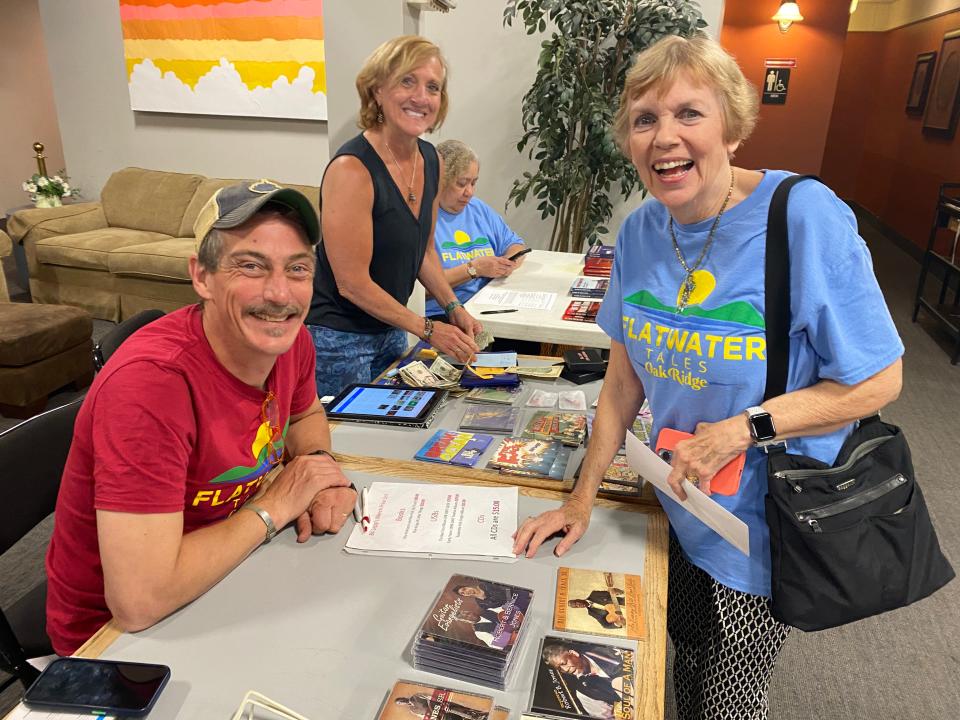Lepp led us to laugh and “ponder on that”
- Oops!Something went wrong.Please try again later.
Whenever award-winning author and recording artist Bil Lepp tells one of his outrageous tales, a lesson leaps up from among the laugh lines. The lessons often have a ring of truth even though Bil, a frequent winner of the West Virginia State Liars Contest, tells hilarious but wildly imaginative stories that sometimes defy the laws of physics.
On a recent Friday night of the 2023 Flatwater Tales Storytelling Festival, sponsored by Oak Ridge’s three Rotary clubs, Bil suggested that children might not discern the intended lessons of familiar stories they are told.
Take the fairy tale of "Little Red Riding Hood." As a child, Bil and his buddy Skeeter, both around 7, were told stories in their hometown of Half Dollar, West Virginia by Skeeter’s uncle. This professor believed that “you can teach people lessons by telling them stories,” Bil said. “But he would never tell us the moral of the story. He would just finish the story and then he would say, ‘Now ponder on that and maybe you’ll learn something.’”
In the "Little Red Riding Hood" fairy tale that Skeeter’s uncle told the boys, a hungry wolf ate the girl’s grandmother and then he dressed in her bed clothing in her house as he waited for the girl he met earlier to arrive with food for her grandmother. Then the wolf ate her, too. The wolf is believed to symbolize a lustful man.

Lepp said, “Now, I'm not going to tell you the story of 'Little Red Riding Hood' because I bet you know it, and in West Virginia, Tennessee, Georgia and Alabama, you can't tell that story anymore because at the end that wolf is in drag!” (Soon after it was announced that Tennessee’s so-called anti-drag law, the first in the nation, had been declared unconstitutional by a federal judge.)
In Lepp’s story, he and Skeeter were supposed to walk from the uncle’s house to that of Skeeter’s grandmother. But Skeeter called for a change of plans because he “pondered on” his uncle’s story and decided it was unwise to follow his parents’ order. “If we go to my grandma’s house, she’s gonna get eaten by a wolf and I don't want that to happen.”
So, the boys spent the afternoon buying candy, catching salamanders from a creek, watching firemen at work and TV at a friend’s house before they returned to Skeeter’s house. There they learned that they had been considered “lost” and that the sheriff had been called to help family members look for them. Skeeter’s grandmother had come to Skeeter’s house because she was worried about him.
Skeeter explained that they didn’t go to his grandmother’s house out of fear that she would be eaten by a wolf.
"She was so moved, and she thought it funny that we didn’t get into trouble,” Lepp said. “I think that’s the real lesson we learned that time.”"
Skeeter’s uncle told them a story involving the Jack character of the “Jack and the Beanstalk” fairy tale. Jack, his mother, and his two brothers Will and Tom are poor. She instructs each son at different times to go to the woods, chop down a tree and sell the firewood. Each is given a sandwich or part of one brought back.
Will and Tom pass a pitiful person who says, “I'm hungry. Do you have anything to spare?” And both say, “No, get a job!” Each brother injures a limb when his ax bounces off the tree. Each comes home, gets stitches and impoverishes the family further because of medical bills.

So, Jack heads off with the leftover sandwich crust and a drink. When he encounters the person asking for food, Jack says, “I don't have much but I'll give you half.” As a reward for his generosity, the person advises Jack to cut down a different tree – one that is next to the one that has 20 chop marks and two pools of blood – because that intact tree will offer him “a special thing that will lead to your fortune.” A golden goose with sticky feathers appeared on the stump.
Jack took the goose and his firewood to town. While selling the firewood, people were attracted to the golden goose and those who touched its golden feathers got stuck to it. Soon Jack unknowingly was pulling half the town past the king’s castle. The king was distraught because his daughter hadn’t smiled or laughed for eight years since she turned 13.
He promised that any man who could make his daughter laugh could marry her.
"When the princess saw Jack with the golden goose and half the town stuck to it, she giggles,” Lepp said. “The king is so happy. Jack and the princess get married, and he gets the fortune.”
Now, Bil and Skeeter as second graders were told by Skeeter’s uncle to “ponder on that story and maybe you'll learn something.” They didn’t seem to get the fairy tale’s value-of-generosity lesson. They focused on the fact that Skeeter was in love with the young daughter of Angus Fester, the mean old dairy farmer.
They stole a fake goose ornament from somebody’s yard, coated it with rubber cement, placed it by Fester’s mailbox and hid in the woods. Angus later approached the mailbox, picked up the fake golden goose, got one hand stuck to it and used the other hand to push it off. The fake goose fell and broke, Fester’s daughter saw her father’s actions from the porch, and she laughed. But, Lepp said in conclusion, “Skeeter didn’t get married to her.”
During the Saturday night performance, Lepp said he doesn’t like the “Hansel and Gretel” folk story because Hansel and Gretel’s father who married a certain woman – the so-called “evil stepmother” who wanted the children to be left in the woods to starve to death – is “a jerk” for allowing what happened.
"Stepmothers get a bad rap,” he said. “What about the dad who’s picking these women?”
Lepp told the story of Hank, who opened a Chinese restaurant in Half Dollar, and Lester, a town native who accidentally jammed a corn dog in his eye while driving distracted as he noticed women in bikinis on a California beach. He ended up with a glass eye.
"He was medically discharged from the Army,” Lepp said. “Lester was upset because they didn't give him a Purple Heart. He couldn’t get a job in California, so he went back to Half Dollar and went to the only bar in town.” There he learned he could make money by betting doubtful people in bars all over the country that he could “lick his own eye” and then removing his glass eye and licking it.
Lester and other Half Dollar residents didn’t like Hank mainly because they considered him a foreigner with an accent. In fact, Lepp said, Hank’s American ancestors of many generations had intermarried, and Hank had a Boston accent.
"Technically genetically, Hank was probably mostly Chinese,” Lepp added. “But he was as American as apple pie and xenophobia.”
Many Half Dollar residents patronized Hank’s restaurant because they enjoyed the food and people’s reactions to the fortune cookies, some of which had messages purposely put there by Hank for customers he knew needed admonishment or advice, such as “She knows” or “Compliment her shoes.” The patrons included the obese Sheriff Hasbro and the congregation of Lester after he returned to Half Dollar and became a preacher. According to Lepp, during a church service Lester would “pull out his glass eye, say this is the Eye of the Lord, wash it and roll it down the aisle.”
As an aside, Lepp, who had served as a preacher for four years, noted that after COVID-19, some church leaders began to consider the traditional “Joys and Concerns” part of the worship service as “church-sanctioned gossip.” As an example, Lepp said, a person announcing a “concern” might say, “I think he's drinking again and her hair salon burned down and she’s going back to prison, so pray for her mom.”
According to Lepp, Lester told the congregation to go to Hank’s restaurant before other congregations arrived there each Sunday and deal with the “demons in the foods” by holding hands, praying over the Chinese food, performing an exorcism and then eating it to see if the demons were gone.
As Lepp put it, “They would hate the sin but love the dinner.”
Later, when Bil and Skeeter, then about 16 years old, were in Hank’s restaurant, a robber with a bag over his head entered and forced Hank to hand over money from the cash register. Sheriff Hasbro was there enjoying the Chinese food. The boys were astonished because he did not chase the robber. The sheriff said he knew who the robber was and would arrest him later.
“It was Lester,” he said. “He only cut one eye out of the bag.”
Did Hank get his money back? Was Lester convicted? What’s the moral?
As Lepp would say, “Go ponder on that!”
This article originally appeared on Oakridger: Lepp leads them to laugh and “ponder on that” at Oak Ridge festival

